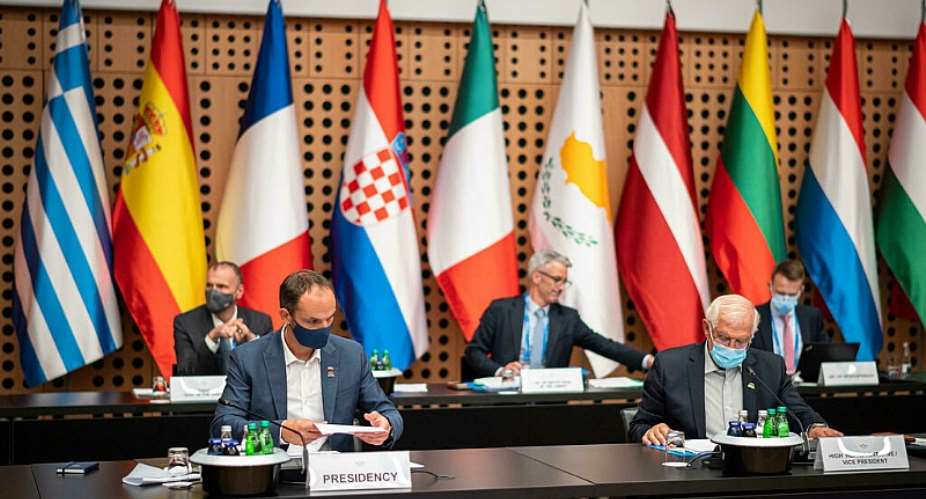EU leaders are meeting to discuss Europe's place in the world Tuesday as they seek unity on how to approach ties with superpowers China and the US, as well as the western Balkans.
The 27 EU heads of state and government are meeting in a castle at the former Yugoslav republic of Slovenia, which holds the EU's rotating presidency.
It's an informal get-together of the European Council.
"This is the first time leaders have met since June, and with everything that has happened, that seems like ages ago", a senior EU diplomat said.
The EU's six Western Balkan parters, Albania and other former Yugoslav republics North Macedonia, Bosnia, Montenegro, Serbia and Kosovo have been invited to a "working dinner" on the eve of the EU-Western Balkans summit on 6 October.
Over dinner, the leaders are to have a "strategic discussion on the role of the EU on the international stage", according to an invitation letter sent out by EU Council President Charles Michel, who organises the summits.
Submarine contract
French President Emmanuel Macron is expected to again warn his partners that Washington's close allegiance to Europe is no longer to be taken for granted, with Paris still smarting over the cancellation of a massive submarine contract to the benefit of the US.
"It would be a mistake to pretend that nothing happened," a French presidency source said ahead of the talks.
France was infuriated last month when Australia cancelled a submarine contract worth 56 billion euros, saying it would instead purchase US nuclear submarines amid rising tensions with China.
EU partners have expressed solidarity with Paris to varying degrees, with Baltic and Nordic countries reluctant to criticise the Cold War superpower that they deem their ultimate protector against Russia.
The subs debacle came weeks after the US pulled its troops out of Afghanistan after two decades, as the Taliban swept to power, catching the Europeans off guard.
Afghanistan lessons
Under the auspices of Nato, the Europeans provided troops and were major donors to the overthrown Afghan regime. The EU has warned it will not recognise the Taliban government, made up largely of all-male Islamist hardliners.
The collapse in Afghanistan – on top of the submarine fallout – has given fresh impetus to those pushing for the EU to develop its own military capabilities, with France leading that charge.
German Chancellor Angela Merkel, the EU's most influential leader for the past 15 years, will attend the EU gathering given that coalition talks in Germany following last week's elections have not yet resulted in a government.
Merkel's cautious pro-US strategy has dominated Europe and her imminent departure will see leaders such as Macron, Italy's Mario Draghi and Dutch Prime Minister Mark Rutte hope to make their mark.
As leader of Germany, the EU's export powerhouse, Merkel has also always encouraged close ties with China, but this has also proven harder to defend as Chinese President Xi Jinping's leadership becomes increasingly centralised and hardline.
The relationship with Beijing grew even more complicated when an EU-China investment deal wanted by Germany was indefinitely put on hold after both sides exchanged tit-for-tat sanctions over the treatment of the Uyghur Muslim minority in China.
Brussels is also worried about China's growing influence in some EU countries, including the former Yugoslav republics that Beijing has included in its "16+1" cooperation project that is part of its massive "Belt and Road Initiative". The controversial trillion dollar infrastructural investment scheme spans the Eurasian continent as well as parts of Africa.
The EU leaders' meeting coincides with a visit to Taipei by a delegation of the French Senate, headed by former defence minister Alain Richard. This comes at a time when Beijing – which views Taiwan as a renegade province – ramps up fighter jet incursions into Taiwanese airspace.
Meanwhile, Spain is to highlight more immediate concerns, calling for a bold EU answer on the sudden rise in energy prices, with France, Greece and Poland also seeking action.
The EU Commission is expected to offer short-term solutions to the energy crunch, with a more in-depth discussion by leaders at a summit on October 21-22.
(With agencies)





 This IMANI job no dey pap; the people you are fighting for are always fighting y...
This IMANI job no dey pap; the people you are fighting for are always fighting y...
 Prof. Naana Opoku-Agyemang has changed; you can see a certain sense of urgency –...
Prof. Naana Opoku-Agyemang has changed; you can see a certain sense of urgency –...
 MFWA Executive Director slams Akoma FM for engaging in ‘irresponsible’ media pra...
MFWA Executive Director slams Akoma FM for engaging in ‘irresponsible’ media pra...
 ‘Women must become millionaires too’ — Prof Jane Naana on establishment of Women...
‘Women must become millionaires too’ — Prof Jane Naana on establishment of Women...
 Some believe only in Ghanaian votes, not Ghana — Kofi Asare jabs politicians
Some believe only in Ghanaian votes, not Ghana — Kofi Asare jabs politicians
 Plan to make BEST sole aggregator of Sentuo Oil Refinery will create market chal...
Plan to make BEST sole aggregator of Sentuo Oil Refinery will create market chal...
 2024 elections: I can't have the man I removed from office as my successor — Aku...
2024 elections: I can't have the man I removed from office as my successor — Aku...
 2024 Elections: Immediate-past NPP Germany Branch Chairman garners massive votes...
2024 Elections: Immediate-past NPP Germany Branch Chairman garners massive votes...
 Gov’t focused on making Ghana energy self-sufficient, eco-friendly – Akufo-Addo
Gov’t focused on making Ghana energy self-sufficient, eco-friendly – Akufo-Addo
 April 25: Cedi sells at GHS13.74 to $1, GHS13.14 on BoG interbank
April 25: Cedi sells at GHS13.74 to $1, GHS13.14 on BoG interbank
